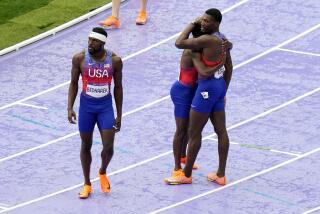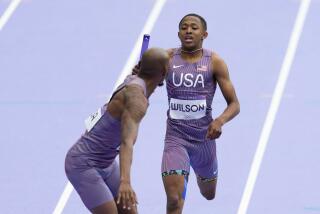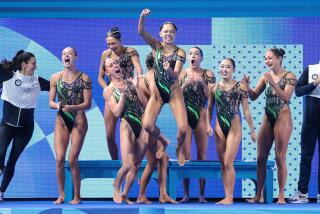Canada Outruns U.S. for Gold in 400-Meter Relay
ATLANTA — With history’s most accomplished 400-meter relay runner watching from a luxury box reserved for dignitaries instead of on the track, the U.S. team crossed the finish line second in that event Saturday night for the first time ever in the Summer Olympics.
Traditionally a nation that dominates the men’s sprints, the United States had won the 400 relay in all but four modern Olympics. In 1912, 1960 and 1988 the United States did not cross the finish line at all after either dropping the baton or being disqualified for technical violations. The United States boycotted the Moscow Olympics in 1980.
The loss before a crowd of 83,313 in Centennial Olympic Stadium led to speculation that the United States might have prevailed if it had called on Carl Lewis, who has run the anchor leg for teams that won gold medals in 1984 and ’92 and set six world records.
But even with Lewis, it would have been difficult for the U.S. quartet to beat 1995 world champion Canada. Anchored by Donovan Bailey, who broke the world record in the 100 meters here eight days ago, the Canadians won the race in 37.69 seconds, the sixth-fastest time ever and fastest by a non-American team, and might have broken the world record of 37.40 if Bailey had not started celebrating several meters before the finish line.
Despite Bailey’s theatrics, the United States finished far behind in 38.05. Brazil was third in 38.41.
“We weren’t thinking about the States, France, Czechoslovakia or spacemen from the moon,” Bailey said. “We were ready to take on whoever lined up against us.”
It appeared as late as Friday night that the man who might line up against Bailey on the vital fourth leg for the United States might be Lewis.
After his eighth-place finish in the 100 during the U.S. trials in June, he was invited to join the U.S. relay team but was not guaranteed that he would run in the Olympics. He chose to focus on his long-jump training.
When he won the long jump Monday night, however, he said that he would like to run in the relay, giving the 35-year-old, five-time Olympian a chance for an unprecedented 10th gold medal. Only three others--Finnish distance runner Paavo Nurmi, Soviet gymnast Larysa Latynina and U.S. swimmer Mark Spitz--have won nine.
U.S. Coach Erv Hunt said that he would consider Lewis if one of the other sprinters was injured, which happened Wednesday when Leroy Burrell, a Lewis training partner with the Santa Monica Track Club, was treated by doctors for acute Achilles’ tendinitis.
Conspiracy theorists speculated that international track and field officials, Lewis’ shoe company sponsor or NBC, who all would benefit from the interest generated by his attempt to win another gold medal, had pressured Burrell to withdraw. An insulted Burrell took a pain-killing shot and worked out Friday, reporting little pain.
But he told Hunt on Saturday that he would be unable to run. Hunt and the relay team’s captain, Dennis Mitchell, conferred about whether to replace Burrell with Lewis or alternates Tim Harden or Tim Montgomery. They chose Harden, a first-time Olympian who was impressive in two qualifying rounds Friday but had problems with baton passes in practices last week.
“Being a team captain, it was a hard decision,” Mitchell said. “It hurt me to tell Tim Montgomery that he couldn’t run. It hurt me to tell Carl that he couldn’t run. Carl accepted it. He was fine. It was a matter of putting the best team out there and the continuity of the team.”
But the U.S. team did not perform well. That was particularly true of Harden, who slowed noticeably while running the second leg when he tried to gain a better grasp of the baton before his exchange with Michael Marsh.
By the time the anchor man, Mitchell, received the baton from Marsh, the United States was a full meter behind. Against Bailey, that might as well have been a mile.
U.S. team members did not second-guess the decision to leave Lewis among the crowd, saying that it would have been difficult to beat the Canadians with any lineup.
“It’s better that it happened this way,” leadoff man Jon Drummond said. “If the Canadians had beaten Carl, then everybody would have blamed Carl.”
More to Read
Go beyond the scoreboard
Get the latest on L.A.'s teams in the daily Sports Report newsletter.
You may occasionally receive promotional content from the Los Angeles Times.






